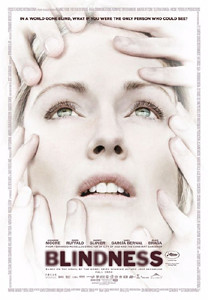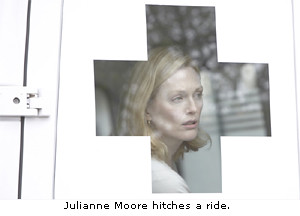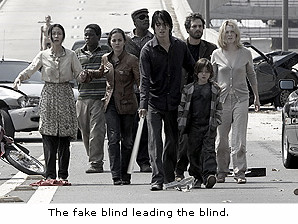 On Friday, I saw one of the best movies I’ve seen in 2008. Hell, that I’ve seen in a while, really. Blindness really blew me away enough to make me forget I was in the weird local independent theatre with the tiny screen and hard seats with zero legroom.
On Friday, I saw one of the best movies I’ve seen in 2008. Hell, that I’ve seen in a while, really. Blindness really blew me away enough to make me forget I was in the weird local independent theatre with the tiny screen and hard seats with zero legroom.
It reminded me a lot of Children of Men, another recent movie that stayed in my head long after the credits rolled. Blindness follows a group of people quarantined in a hospital during an epidemic of blindness. As the quarantined are left alone to their own devices with no medicine, dwindling food, and a couple of power-hungry psychos with weapons, the group breaks down. This is not exactly a new story, but it’s handled wonderfully.
Blindness wisely mines material more interesting than society falling apart by delving into instances of society holding together. When The Doctor’s Wife (played by Julianne Moore, the lone sighted person in the ward who feigns blindness to stay with her quarantined husband) catches her husband in flagrante delicto with The Woman With Dark Glasses (the standard golden-hearted prostitute played with amazing depth and sensitivity by Alice Braga), she does not berate them or storm off in a huff. She instead confesses her secret—her vision—to the other woman. It’s an intimate, unexpected scene, in a film that often goes for the unexpected.
Either ironically or fittingly, the cinematography is absolutely stunning. It’s equal parts austere and sumptuous. All throughout, in fact, the film mixes brutal with beautiful. A wrenching and visually-obscured scene of the Ward 1 women bartering their bodies for food with the brutes of Ward 3 is followed by a restrained, somber scene of the women alone, cleaning up after the horror. It’s one of the most stunning scenes in the film.
The communicability of the mysterious disease lends an interesting angle to the film, as it gives us a set of characters who are strangers but connected. As each new group arrives at the ward, we can piece together exactly how they contracted the disease, see how everyone’s connected. Once the core group breaks out of quarantine (because the guards have all abandoned their posts, indicating that the quarantine didn’t, well, quarantine), they start making their way aimlessly through the city. Near a street corner, one member loses contact with the rest for just a moment, and we watch him silently hobble off, not realizing he’s headed away from the group and without the group realizing he’s gone until it’s too late, and you can see how easily one can become disconnected from society.
Unsurprisingly, the movie has stirred up controversy. From PopEater:
“The movie portrays blind people as monsters, and I believe it to be a lie,” said Maurer, president of the Baltimore-based National Federation of the Blind. “Blindness doesn't turn decent people into monsters.”
That’s a bit of a knee-jerk reaction. The movie doesn’t indicate that blindness turns people into monsters. It does say that people trapped together in deplorable conditions with limited food and limited authority oversight can act in pretty awful ways...this isn’t exactly news. Read survivor accounts written by people who survived time in German death camps in the Holocaust or survived the Russian gulags. Criminy, read Lord of the Flies. Even American prisons, with all their prisoner rights and strict surveillance, have rapes, murders, and hierarchical power plays happening right under the CO’s noses. The violence in Blindness has nothing to do with blindness. Hell, I don’t even think it’s fair to say the movie is “about” blindness any more than Citizen Kane is “about” a sled. These knee-jerk responses from special interest groups can do more harm than good, in my opinion. As far as the portrayal of people being unable to function while blind, this isn’t entirely accurate. For one, there is a character, a henchman to the villain, who is revealed to be in the quarantine despite being blind from birth (instead of from the disease) because, as the villain and self-proclaimed King of Ward 3 says, a man like him can rule in a place like that. And sure enough, he can run circles around the newly-blinded, showing that blindness is not a crippling disability but something that can be managed with proper experience and training. But the fact is, our world was built for the sighted, by the sighted. In my hypothetical “Would I rather be blind or deaf?” musings (because we’re so often presented a choice in that matter…), as much as I love music and as much as it would kill me to be without it for the rest of my life, I always have to choose deaf because it’s easier to navigate this world being deaf than being blind. It’s not fair, but this world is just not set up to be blind-friendly, and while people who are blind can learn to navigate these unfriendly streets, I do think a sudden case of instant-onset blindness that affected most of the population would cause a bit of chaos. At first, anyway. Then we would adjust, because it’s what we do.
As far as the portrayal of people being unable to function while blind, this isn’t entirely accurate. For one, there is a character, a henchman to the villain, who is revealed to be in the quarantine despite being blind from birth (instead of from the disease) because, as the villain and self-proclaimed King of Ward 3 says, a man like him can rule in a place like that. And sure enough, he can run circles around the newly-blinded, showing that blindness is not a crippling disability but something that can be managed with proper experience and training. But the fact is, our world was built for the sighted, by the sighted. In my hypothetical “Would I rather be blind or deaf?” musings (because we’re so often presented a choice in that matter…), as much as I love music and as much as it would kill me to be without it for the rest of my life, I always have to choose deaf because it’s easier to navigate this world being deaf than being blind. It’s not fair, but this world is just not set up to be blind-friendly, and while people who are blind can learn to navigate these unfriendly streets, I do think a sudden case of instant-onset blindness that affected most of the population would cause a bit of chaos. At first, anyway. Then we would adjust, because it’s what we do.
Anyway, the movie is a little rough around the edges, which is perhaps a side effect from endless re-cutting after a few less-than-successful screenings. The movie originally featured a voiceover by Danny Glover (who plays Man With Black Eye Patch) that is now contained in only one small scene in the middle of the movie. The scene sticks out a little strangely because of this, but it’s a nice scene and I’m not surprised they didn’t want it on the cutting room floor.
The music cues are a little off-putting at times, conveying Comedy and Wacky Fun in a film that’s anything but. And the blurred, frenetic visuals occasionally detract from the storytelling, and made it impossible for me to identify which characters were performing which rather important actions, which isn’t a good thing.
I walked out with two more small quibbles that have since been resolved. One was the vague setting that couldn’t be pinned down to a city or even a country, but according to Wikipedia that was one of the conditions the author of the novel on which the movie is based set in order to agree to sell the rights. So I can’t blame the filmmaker for that. Also, the movie is almost evenly split between Society Devolving (the breakout and the quarantine) and Society Rebuilding (post-quarantine), which felt weird. I wanted either more delving into the devolving with a traditional climax and the view towards the happier times to come, or cut some out of the quarantine to delve more into the rebuilding. But the more I thought about it the more I realized they had to be equal, because you couldn’t enjoy the rebuilding without living through the horror of the devolving, and after the horror of the devolving you need a nice, long dose of hope or you’ll walk out of the theatre and out into traffic. This movie resonated more with me than has any movie in recent memory. Afterwards, I had to pick up a few things at the store, and while I was grabbing light bulbs, I spotted a display of flashlights. “Oh, good, I need a flashlight,” I thought, and went to grab one. Then I remembered that I had three working flashlights at home (including one that’s suitable for self-defense), and I’d just changed all their batteries, so why in the world did I think I needed another? It dawned on me that in one scene of the movie, I was thinking how much The Doctor's Wife could use a flashlight, and I must have carried that out with me. It was an hour later and three towns away and my head was still stuck in the movieverse. With so much disposable cinema these days, that seems like a rare feat.
This movie resonated more with me than has any movie in recent memory. Afterwards, I had to pick up a few things at the store, and while I was grabbing light bulbs, I spotted a display of flashlights. “Oh, good, I need a flashlight,” I thought, and went to grab one. Then I remembered that I had three working flashlights at home (including one that’s suitable for self-defense), and I’d just changed all their batteries, so why in the world did I think I needed another? It dawned on me that in one scene of the movie, I was thinking how much The Doctor's Wife could use a flashlight, and I must have carried that out with me. It was an hour later and three towns away and my head was still stuck in the movieverse. With so much disposable cinema these days, that seems like a rare feat.
Tuesday, October 7, 2008
Movies: Blindness
Subscribe to:
Post Comments (Atom)


1 comment:
I'll keep that one in mind.
Sex Mahoney for President
Post a Comment